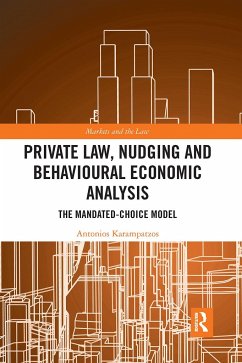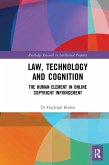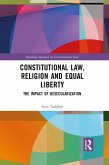- Broschiertes Buch
- Merkliste
- Auf die Merkliste
- Bewerten Bewerten
- Teilen
- Produkt teilen
- Produkterinnerung
- Produkterinnerung
Offering a fresh perspective on "nudging", this book uses legal paternalism to explore how legal systems may promote good policies without ignoring personal autonomy.
Andere Kunden interessierten sich auch für
![Fundamental Rights and Private Law in Europe Fundamental Rights and Private Law in Europe]() Nuno FerreiraFundamental Rights and Private Law in Europe68,99 €
Nuno FerreiraFundamental Rights and Private Law in Europe68,99 €![China's One Belt One Road Initiative and Private International Law China's One Belt One Road Initiative and Private International Law]() China's One Belt One Road Initiative and Private International Law64,99 €
China's One Belt One Road Initiative and Private International Law64,99 €![Gene Editing, Law, and the Environment Gene Editing, Law, and the Environment]() Gene Editing, Law, and the Environment68,99 €
Gene Editing, Law, and the Environment68,99 €![Law, Technology and Cognition Law, Technology and Cognition]() Hayleigh BosherLaw, Technology and Cognition64,99 €
Hayleigh BosherLaw, Technology and Cognition64,99 €![Constitutional Law, Religion and Equal Liberty Constitutional Law, Religion and Equal Liberty]() Azin TadjdiniConstitutional Law, Religion and Equal Liberty63,99 €
Azin TadjdiniConstitutional Law, Religion and Equal Liberty63,99 €![Law, Palliative Care and Dying Law, Palliative Care and Dying]() John LombardLaw, Palliative Care and Dying64,99 €
John LombardLaw, Palliative Care and Dying64,99 €![Law, Culture and Society Law, Culture and Society]() Roger CotterrellLaw, Culture and Society74,99 €
Roger CotterrellLaw, Culture and Society74,99 €-
-
-
Offering a fresh perspective on "nudging", this book uses legal paternalism to explore how legal systems may promote good policies without ignoring personal autonomy.
Hinweis: Dieser Artikel kann nur an eine deutsche Lieferadresse ausgeliefert werden.
Hinweis: Dieser Artikel kann nur an eine deutsche Lieferadresse ausgeliefert werden.
Produktdetails
- Produktdetails
- Verlag: Routledge
- Seitenzahl: 190
- Erscheinungstermin: 13. Dezember 2021
- Englisch
- Abmessung: 234mm x 156mm x 10mm
- Gewicht: 298g
- ISBN-13: 9781032238920
- ISBN-10: 1032238925
- Artikelnr.: 62995633
- Herstellerkennzeichnung
- Libri GmbH
- Europaallee 1
- 36244 Bad Hersfeld
- gpsr@libri.de
- Verlag: Routledge
- Seitenzahl: 190
- Erscheinungstermin: 13. Dezember 2021
- Englisch
- Abmessung: 234mm x 156mm x 10mm
- Gewicht: 298g
- ISBN-13: 9781032238920
- ISBN-10: 1032238925
- Artikelnr.: 62995633
- Herstellerkennzeichnung
- Libri GmbH
- Europaallee 1
- 36244 Bad Hersfeld
- gpsr@libri.de
Antonios Karampatzos is Associate Professor of Private Law at the Law School of National and Kapodistrian University of Athens.
Preface
About the author
PART A
Behavioral economic analysis of law, nudge theory, and freedom of choice
1 Behavioral economic analysis of law (or behavioural law and economics)
and paternalistic interference
I The emergence of behavioral economic analysis of law and its instrumental
value in the field of law
II Do all individuals act irrationally?
III Are all behavioral biases bad?
IV Undermining the learning effect or experience through state
interference: a moral hazard issue
2 Sunstein and Thaler's nudge theory, the steering of people's behavior by
means of default or opt-out rules, and the promotion of a 'mild' or
'libertarian' paternalism
I Introductory remarks
II The pervasiveness of loss aversion and the endowment effect
III The case for 'mild' or 'libertarian' paternalism and the proposed
paradigm shift
IV Beyond default rules: informational nudges and cooling-off periods
V Main objections to nudging through default rules and arguments in favor
of it
1 The deficiencies of centralized regulation
2 Undermining human dignity and personal autonomy through manipulation
a Main points of the objection
b Rebuttal
aa The particular nature and function of default rules and the benefit from
their legislative use
bb Personal autonomy in need of a rethink?
c The separate issue of informational nudging and the specific dangers
associated with it
3 Negative externalities
VI Toward an acceptable application of the nudge theory mainly on the basis
of the principle of proportionality
VII Default rules or freedom of active choosing?
VIII The recent trend toward personalizing private law
3 Beyond defaults, opt-out or opt-in systems: the recourse to the visible
hand of the mandated-choice model
PART B
EU private law and possible scope of application of the mandated-choice
model under a Behavioral Economic Analysis of Law (BEAL) approach
4 The withdrawal right pursuant to Directive 2011/83/EU and the application
of the mandated-choice model
I Directive 2011/83/EU on Consumer Rights
II The withdrawal right
1 The withdrawal right justified by virtue of BEAL
2 The rationale behind the withdrawal right in distance contracts
3 A third way: the mandated-choice model as a means of reinforcing private
autonomy and efficiently protecting consumers
a The need to steer a middle course between mandatory and default rules
b The mandated-choice solution
c Insurance premium and the issue of cross-subsidization
d Insurance premium and the issue of opportunistic consumer behavior
e Juxtaposition with a scheme of personalized mandatory rules
f Concluding remarks: the middle course between mandatory and default
rules, tertium datur
5 The clause 'as is where is' in a sales contract and the application of
the mandated-choice model
I Introductory remarks
II The barrier of EU law on consumer protection
III Applying the mandated-choice model
6 Strict product liability and mandated-choice model: why are they
incompatible?
I Framing the question
II Arguments against the application of the mandated-choice model
III The moral hazard issue
VI Concluding remarks
7 Final remarks: the philosophical foundations of freedom of choice and
personal autonomy and the specific affiliation of the mandated-choice model
to them
I From Kant's and Mill's perception of personal autonomy to legal
paternalism
II Mild paternalism and the visible hand of the mandated-choice model
III "Be Homer's works your study and delight": when mild paternalism meets
Odysseus
Bibliography
Index
About the author
PART A
Behavioral economic analysis of law, nudge theory, and freedom of choice
1 Behavioral economic analysis of law (or behavioural law and economics)
and paternalistic interference
I The emergence of behavioral economic analysis of law and its instrumental
value in the field of law
II Do all individuals act irrationally?
III Are all behavioral biases bad?
IV Undermining the learning effect or experience through state
interference: a moral hazard issue
2 Sunstein and Thaler's nudge theory, the steering of people's behavior by
means of default or opt-out rules, and the promotion of a 'mild' or
'libertarian' paternalism
I Introductory remarks
II The pervasiveness of loss aversion and the endowment effect
III The case for 'mild' or 'libertarian' paternalism and the proposed
paradigm shift
IV Beyond default rules: informational nudges and cooling-off periods
V Main objections to nudging through default rules and arguments in favor
of it
1 The deficiencies of centralized regulation
2 Undermining human dignity and personal autonomy through manipulation
a Main points of the objection
b Rebuttal
aa The particular nature and function of default rules and the benefit from
their legislative use
bb Personal autonomy in need of a rethink?
c The separate issue of informational nudging and the specific dangers
associated with it
3 Negative externalities
VI Toward an acceptable application of the nudge theory mainly on the basis
of the principle of proportionality
VII Default rules or freedom of active choosing?
VIII The recent trend toward personalizing private law
3 Beyond defaults, opt-out or opt-in systems: the recourse to the visible
hand of the mandated-choice model
PART B
EU private law and possible scope of application of the mandated-choice
model under a Behavioral Economic Analysis of Law (BEAL) approach
4 The withdrawal right pursuant to Directive 2011/83/EU and the application
of the mandated-choice model
I Directive 2011/83/EU on Consumer Rights
II The withdrawal right
1 The withdrawal right justified by virtue of BEAL
2 The rationale behind the withdrawal right in distance contracts
3 A third way: the mandated-choice model as a means of reinforcing private
autonomy and efficiently protecting consumers
a The need to steer a middle course between mandatory and default rules
b The mandated-choice solution
c Insurance premium and the issue of cross-subsidization
d Insurance premium and the issue of opportunistic consumer behavior
e Juxtaposition with a scheme of personalized mandatory rules
f Concluding remarks: the middle course between mandatory and default
rules, tertium datur
5 The clause 'as is where is' in a sales contract and the application of
the mandated-choice model
I Introductory remarks
II The barrier of EU law on consumer protection
III Applying the mandated-choice model
6 Strict product liability and mandated-choice model: why are they
incompatible?
I Framing the question
II Arguments against the application of the mandated-choice model
III The moral hazard issue
VI Concluding remarks
7 Final remarks: the philosophical foundations of freedom of choice and
personal autonomy and the specific affiliation of the mandated-choice model
to them
I From Kant's and Mill's perception of personal autonomy to legal
paternalism
II Mild paternalism and the visible hand of the mandated-choice model
III "Be Homer's works your study and delight": when mild paternalism meets
Odysseus
Bibliography
Index
Preface
About the author
PART A
Behavioral economic analysis of law, nudge theory, and freedom of choice
1 Behavioral economic analysis of law (or behavioural law and economics)
and paternalistic interference
I The emergence of behavioral economic analysis of law and its instrumental
value in the field of law
II Do all individuals act irrationally?
III Are all behavioral biases bad?
IV Undermining the learning effect or experience through state
interference: a moral hazard issue
2 Sunstein and Thaler's nudge theory, the steering of people's behavior by
means of default or opt-out rules, and the promotion of a 'mild' or
'libertarian' paternalism
I Introductory remarks
II The pervasiveness of loss aversion and the endowment effect
III The case for 'mild' or 'libertarian' paternalism and the proposed
paradigm shift
IV Beyond default rules: informational nudges and cooling-off periods
V Main objections to nudging through default rules and arguments in favor
of it
1 The deficiencies of centralized regulation
2 Undermining human dignity and personal autonomy through manipulation
a Main points of the objection
b Rebuttal
aa The particular nature and function of default rules and the benefit from
their legislative use
bb Personal autonomy in need of a rethink?
c The separate issue of informational nudging and the specific dangers
associated with it
3 Negative externalities
VI Toward an acceptable application of the nudge theory mainly on the basis
of the principle of proportionality
VII Default rules or freedom of active choosing?
VIII The recent trend toward personalizing private law
3 Beyond defaults, opt-out or opt-in systems: the recourse to the visible
hand of the mandated-choice model
PART B
EU private law and possible scope of application of the mandated-choice
model under a Behavioral Economic Analysis of Law (BEAL) approach
4 The withdrawal right pursuant to Directive 2011/83/EU and the application
of the mandated-choice model
I Directive 2011/83/EU on Consumer Rights
II The withdrawal right
1 The withdrawal right justified by virtue of BEAL
2 The rationale behind the withdrawal right in distance contracts
3 A third way: the mandated-choice model as a means of reinforcing private
autonomy and efficiently protecting consumers
a The need to steer a middle course between mandatory and default rules
b The mandated-choice solution
c Insurance premium and the issue of cross-subsidization
d Insurance premium and the issue of opportunistic consumer behavior
e Juxtaposition with a scheme of personalized mandatory rules
f Concluding remarks: the middle course between mandatory and default
rules, tertium datur
5 The clause 'as is where is' in a sales contract and the application of
the mandated-choice model
I Introductory remarks
II The barrier of EU law on consumer protection
III Applying the mandated-choice model
6 Strict product liability and mandated-choice model: why are they
incompatible?
I Framing the question
II Arguments against the application of the mandated-choice model
III The moral hazard issue
VI Concluding remarks
7 Final remarks: the philosophical foundations of freedom of choice and
personal autonomy and the specific affiliation of the mandated-choice model
to them
I From Kant's and Mill's perception of personal autonomy to legal
paternalism
II Mild paternalism and the visible hand of the mandated-choice model
III "Be Homer's works your study and delight": when mild paternalism meets
Odysseus
Bibliography
Index
About the author
PART A
Behavioral economic analysis of law, nudge theory, and freedom of choice
1 Behavioral economic analysis of law (or behavioural law and economics)
and paternalistic interference
I The emergence of behavioral economic analysis of law and its instrumental
value in the field of law
II Do all individuals act irrationally?
III Are all behavioral biases bad?
IV Undermining the learning effect or experience through state
interference: a moral hazard issue
2 Sunstein and Thaler's nudge theory, the steering of people's behavior by
means of default or opt-out rules, and the promotion of a 'mild' or
'libertarian' paternalism
I Introductory remarks
II The pervasiveness of loss aversion and the endowment effect
III The case for 'mild' or 'libertarian' paternalism and the proposed
paradigm shift
IV Beyond default rules: informational nudges and cooling-off periods
V Main objections to nudging through default rules and arguments in favor
of it
1 The deficiencies of centralized regulation
2 Undermining human dignity and personal autonomy through manipulation
a Main points of the objection
b Rebuttal
aa The particular nature and function of default rules and the benefit from
their legislative use
bb Personal autonomy in need of a rethink?
c The separate issue of informational nudging and the specific dangers
associated with it
3 Negative externalities
VI Toward an acceptable application of the nudge theory mainly on the basis
of the principle of proportionality
VII Default rules or freedom of active choosing?
VIII The recent trend toward personalizing private law
3 Beyond defaults, opt-out or opt-in systems: the recourse to the visible
hand of the mandated-choice model
PART B
EU private law and possible scope of application of the mandated-choice
model under a Behavioral Economic Analysis of Law (BEAL) approach
4 The withdrawal right pursuant to Directive 2011/83/EU and the application
of the mandated-choice model
I Directive 2011/83/EU on Consumer Rights
II The withdrawal right
1 The withdrawal right justified by virtue of BEAL
2 The rationale behind the withdrawal right in distance contracts
3 A third way: the mandated-choice model as a means of reinforcing private
autonomy and efficiently protecting consumers
a The need to steer a middle course between mandatory and default rules
b The mandated-choice solution
c Insurance premium and the issue of cross-subsidization
d Insurance premium and the issue of opportunistic consumer behavior
e Juxtaposition with a scheme of personalized mandatory rules
f Concluding remarks: the middle course between mandatory and default
rules, tertium datur
5 The clause 'as is where is' in a sales contract and the application of
the mandated-choice model
I Introductory remarks
II The barrier of EU law on consumer protection
III Applying the mandated-choice model
6 Strict product liability and mandated-choice model: why are they
incompatible?
I Framing the question
II Arguments against the application of the mandated-choice model
III The moral hazard issue
VI Concluding remarks
7 Final remarks: the philosophical foundations of freedom of choice and
personal autonomy and the specific affiliation of the mandated-choice model
to them
I From Kant's and Mill's perception of personal autonomy to legal
paternalism
II Mild paternalism and the visible hand of the mandated-choice model
III "Be Homer's works your study and delight": when mild paternalism meets
Odysseus
Bibliography
Index








